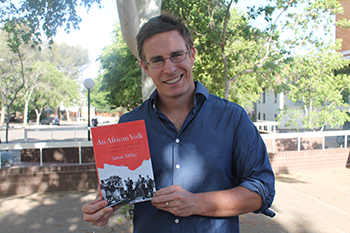Latest News Archive
Please select Category, Year, and then Month to display items
12 December 2024
|
Story Lacea Loader
|
Photo Supplied
 Dr Cias Tsotetsi, newly appointed Campus Vice-Principal: Academic and Research on the UFS Qwaqwa Campus.
Dr Cias Tsotetsi, newly appointed Campus Vice-Principal: Academic and Research on the UFS Qwaqwa Campus.
The University of the Free State (UFS) is pleased to announce the appointment of Dr Cias Tsotetsi as the Campus Vice-Principal: Academic and Research on the UFS Qwaqwa Campus as from 1 January 2025.
He is currently Senior Lecturer and Assistant Dean in the Faculty of Education on the UFS Qwaqwa Campus. He holds the following qualifications: BEd(Hons), Postgraduate Diploma in Education, Magister Educationis with specialisation in Policy Studies and Governance in Education, and PhD with specialisation in Philosophy and Policy Studies in Education – all from the UFS.
Dr Tsotetsi operated in the school environment for about 24 years before joining this university in 2010. Since then, he has taught several modules in the Faculty of Education and published several co-authored research articles as well as conference papers on community engagement, teacher development, and participatory action research methodologies, among others. He is also well versed in supervising postgraduate students.
He has received awards from both the university’s Scholarship of Teaching and Learning and the Research committees for his research and academic scholastic performance. He is a member of various committees, such as the Faculty of Education Academic Advisory Board and the Committee for Title Registration and has been participating in partnerships and in NRF-funded projects with peers from universities such as the University of KwaZulu-Natal, the University of Zululand, the Durban University of Technology, and the University of Venda.
“Dr Tsotetsi has a clear understanding of the current systems and operations on the Qwaqwa Campus and is positioned to drive its development. His experience and initiatives involving staff and postgraduate students are exceptional and inspiring. We look forward to Dr Tsotetsi’s valuable contribution to the UFS Qwaqwa Campus and the institution in his new position,” says Prof Prince Ngobeni, Campus Principal of the Qwaqwa Campus.
“I feel honoured to serve the university – and the Qwaqwa Campus in particular – and look forward to working with the campus and its management to develop the research portfolio,” says Dr Tsotetsi.
US author launches book at UFS on African volk
2016-10-17

Dr Jamie Miller, Postdoctoral Fellow at the
University of Pittsburgh and author of
An African Volk: The Apartheid Regime
and Its Search for Survival.
Photo: Rulanzen Martin
“I realised the importance of not just accessing the policies and political approaches of the leaders of the apartheid regime, but understanding the ideas and world views that informed them. Part of the solution to this was to learn Afrikaans.”
This is according to Dr Jamie Miller, a Postdoctoral Fellow at the University of Pittsburgh, on how he went about getting inside the mind of South Africa’s apartheid regime in order to complete his book, An African Volk: The Apartheid Regime and Its Search for Survival.
The book was launched on 11 October 2016 by the Archive for Contemporary Affairs at the University of the Free State on the Bloemfontein Campus.
Volk refers to the Afrikaner nationalist movement
The book is an ambitious new international history of 1970s apartheid South Africa. It is based on newly declassified documents and oral histories, the majority in Afrikaans, which focus on the regime’s attempts to turn the new political climate to its advantage.
The term volk refers to the Afrikaner nationalist movement, also known as Afrikanerdom. The story of Afrikaner nationalism was the medium through which the regime gained power.
Four main messages from the book
Dr Miller says there are four main messages for his readers. Firstly, the apartheid regime looked to contest and hijack new ideas and norms that formed the postcolonial world, and secondly, that we need to start thinking more seriously about the Cold War in terms of domestic politics, not just geopolitics.
Thirdly, South Africa should be integrated into histories of the global South, and lastly, we should conceptualise the apartheid regime by looking at it not just as an imperial holdover, but also by looking at what was happening in the world in the time period in question.